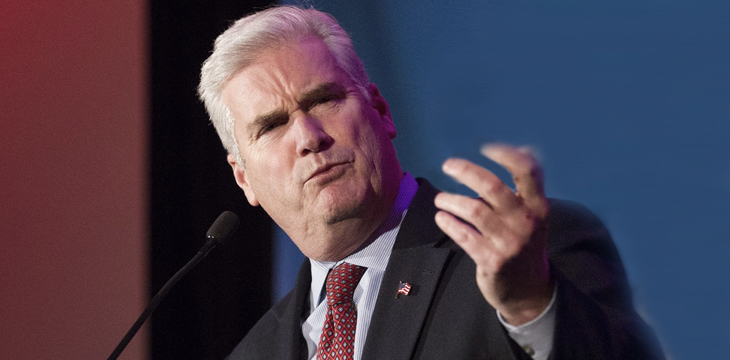|
Getting your Trinity Audio player ready...
|
A new industrial revolution is coming. This will be the fourth such revolution in man’s history, and blockchain technology will be at its center. Many individuals across the globe already recognize this, despite the hesitation on the part of state governments to embrace it. Several lawmakers have set out to help propel changes, and one is U.S. Congressman Tom Emmer, who is calling for a cryptocurrency revolution.
Emmer is bullish on crypto and the blockchain technology that drives it. Speaking as a chairperson for the Congressional Blockchain Caucus during the D.C. Blockchain Summit last week, Emmer said that crypto is at the heart of the upcoming technological revolution and added, “Many, including those in this town, would like to focus only on blockchain and ignore or criticize cryptocurrency. They will tell us that Bitcoin is used by criminals, and the blockchain is a real innovation. It’s true, there are illicit transactions. But that should not be a reason to totally dismiss cryptocurrency.”
He further stated, “This is the revolutionary aspect of this technology, the idea that we can develop an open network in which we control our own data, while freely interacting with each other, and without having to trust gatekeepers. That idea could be one of the major breakthroughs of our lifetime.”
Emmer believes that 2019 is going to be the “year of blockchain.” He says that it will be “the year we separate hype from reality, and begin harnessing blockchain in the right-use cases to lower costs and increase efficiency.”
The lawmaker introduced a bill this past January, the Blockchain Regulatory Certainty Act, that would allow blockchain developers to operate freely without the need of a money transmitter license, provided they don’t take control of consume funds. He explained, “Money transmitter laws were enacted to ensure the protection of the consumer entrusting another entity with their funds in order to transmit them. If no funds are being entrusted to another, it should be certain that these regulations do not apply.”
During the summit, Emmer emphasized what Congress needs to do in order to create any policy. He explained, “Congress has a clear role: we must insure that regulation is simple and precise. If a patchwork of regulations emerges, the industry will suffer, and prove government to be ineffective. This confusion will undoubtedly lead to more regulation, which will only stifle the innovation and potential application of the technology.”
Whether everyone is ready to admit it or not, crypto is here and it’s here to stay. It would be a much more valuable use of resources if policymakers focused on how to embrace the technology and not on how to suppress it.

 02-20-2026
02-20-2026 




